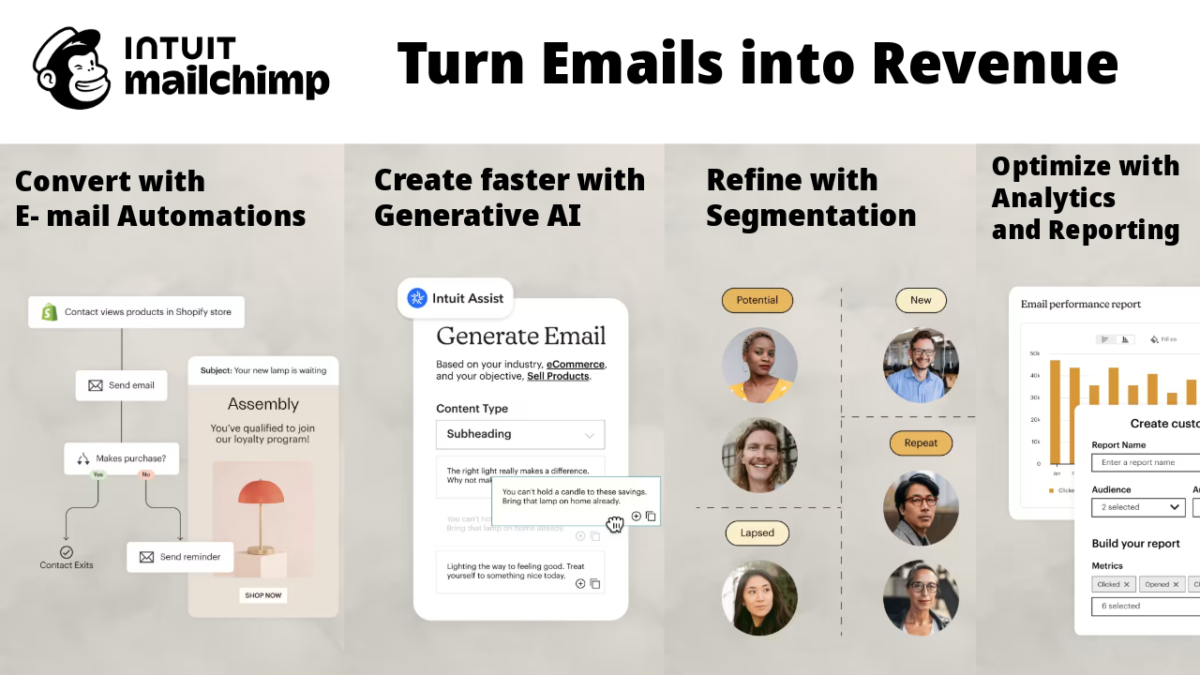Mailchimp Review: A Comprehensive Look at the Leading Email Marketing Platform
Table of Contents
Introduction
Mailchimp is one of the most popular email marketing platforms, known for its user-friendly interface, automation capabilities, and extensive integrations. Initially launched as an email marketing tool, Mailchimp has evolved into a full-fledged marketing platform offering customer relationship management (CRM), analytics, and social media marketing tools.
For businesses looking to streamline their email marketing efforts, Mailchimp promises an all-in-one solution. But does it live up to the hype? This review explores Mailchimp’s features, pricing, advantages, and drawbacks to help you decide if it fits your business needs.
Key Features
1. Email Marketing & Automation
Mailchimp allows users to create and send professional emails with its drag-and-drop email builder. It also offers advanced automation features such as:
- Welcome emails for new subscribers
- Abandoned cart reminders
- Follow-up sequences
- Personalized recommendations
2. Audience Management
With built-in CRM capabilities, Mailchimp helps businesses manage their contact lists efficiently. Features include:
- Segmentation and tagging for targeted email campaigns
- Contact profiles for personalized marketing
- Predictive analytics to understand customer behavior
3. A/B Testing & Analytics
Mailchimp provides detailed analytics to measure email campaign performance. It offers:
- A/B testing for subject lines, content, and send times
- Click-through rate, open rate, and conversion tracking
- Customer journey mapping
4. Website & E-commerce Integrations
Mailchimp integrates with popular e-commerce platforms such as Shopify, WooCommerce, and BigCommerce. This allows businesses to:
- Sync customer data for targeted email campaigns
- Automate product recommendations
- Track sales performance
5. Social Media & Ad Campaigns
Beyond email marketing, Mailchimp enables businesses to create and manage social media campaigns. Users can:
- Schedule and post content on Facebook, Instagram, and Twitter
- Run Facebook and Instagram ads directly from Mailchimp
- Track ad performance alongside email marketing efforts
Pricing Plans
Mailchimp offers a range of pricing plans catering to businesses of all sizes:
1. Free Plan (Up to 500 contacts)
- Basic email templates
- Limited automation features
- One audience segment
2. Essentials Plan (Starting at $13/month)
- A/B testing
- Custom branding
- 24/7 email and chat support
3. Standard Plan (Starting at $20/month)
- Advanced automation
- Behavioral targeting
- Dynamic content personalization
4. Premium Plan (Starting at $350/month)
- Advanced segmentation
- Multivariate testing
- Dedicated onboarding support
Pros and Cons
Pros:
- User-Friendly Interface: Easy to navigate, even for beginners
- Extensive Integrations: Works with over 250 apps and platforms
- Robust Automation Features: Saves time and enhances engagement
- Detailed Analytics: Provides insights for campaign optimization
- Scalability: Suitable for small businesses and large enterprises
Cons:
- Expensive for Larger Lists: Pricing increases significantly as the contact list grows
- Limited Customer Support on Free Plan: No live chat or phone support
- Complex Automation Setup: Some advanced features require a learning curve
- Restrictions on Affiliate Marketing: Not ideal for businesses relying on affiliate email promotions
Who Should Use ?
- Small businesses looking for an easy-to-use email marketing platform
- E-commerce businesses wanting seamless integration with Shopify and WooCommerce
- Marketers who need automation and segmentation features
- Content creators and bloggers building an engaged audience
However, businesses with very large email lists or advanced automation needs may find alternative platforms like ActiveCampaign or HubSpot more suitable.
Final Verdict
Mailchimp remains one of the best email marketing platforms for small and medium-sized businesses. Its combination of email automation, CRM tools, and marketing integrations makes it a powerful tool for customer engagement.
However, its pricing structure may not be ideal for businesses with rapidly growing email lists. Before committing, it’s advisable to explore Mailchimp’s free plan to determine if it meets your business requirements.
If you need a user-friendly, all-in-one marketing platform, Mailchimp is a solid choice. But if you require advanced automation or more cost-effective solutions for large lists, you may want to explore other alternatives.
Would you consider Mailchimp for your email marketing needs? Let us know your thoughts in the comments.
You May Also Like: 7 Key Features of a Customer Experience Management Platform





